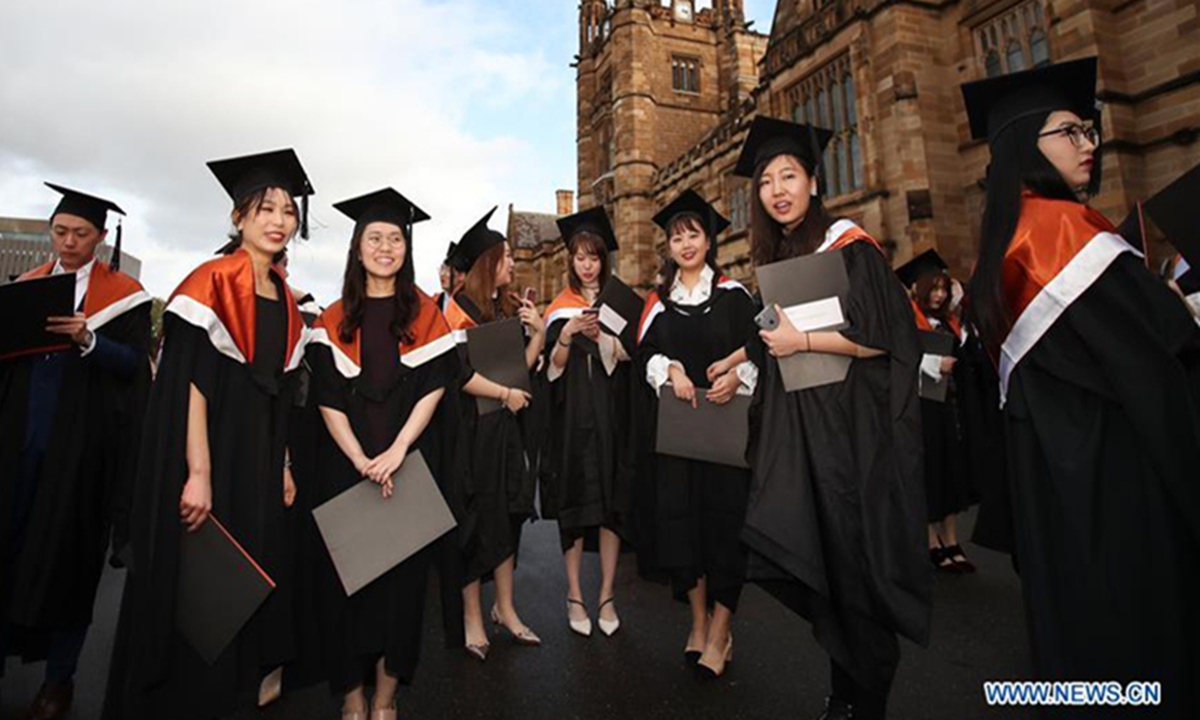
Graduates are seen at the campus of University of Sydney, Australia, June 5, 2019. File Photo: Xinhua
In an exclusive interview with the Global Times on Thursday, Vicki Thomson, chief executive of the Group of Eight, which represents elite Australian universities, expressed her strong wish to boost connections with China. She said, "We look forward to welcoming them [Chinese students] back as soon as possible."
However, a report by the Chinese version of the Voice of America said that Thomson's review has been criticized by those who accused the Australian universities of sacrificing Australian values and even Australian security in order to increase earnings.
The idea of linking ideology with academic fields turns out to be really absurd. Some Western countries, including Australia, have portrayed themselves as advocates of academic freedom. But on the other hand, they tend to put ideological differences above academic freedom. Haven't they realized how hypocritical they are?
Australia labels itself as "the world's most successful multicultural society," and claims that the country was once one of the favorable destinations for education among Chinese students, which contributes a lot to its economic development.
However, with the deterioration in China-Australia ties, some Australian politicians politicized quite a few China-related topics. Some Chinese students were groundlessly deported for concealing military training, and some Australia research institutes have suspended their collaboration with Chinese organizations.
Such a situation goes against the trend of the times and is not conducive to the sound development of China-Australia relations. Many Chinese students are reluctant to go to study in Australia given its hostile atmosphere, undermined by some Australian politicians.
International education is a big contributor to Australia's economy and Chinese students accounted for a big portion of international students in Australia. In 2019, before the severe and evident deterioration in China-Australia ties, international education contributed A$40 billion ($29 billion) to Australian economy. But the number of Chinese students in Australia is declining. According to data provided by the Australian Department of Education, Skills and Employment, there were 166,319 Chinese students in Australia in January-September 2021, dropping nearly 13 percent year-on-year. There were 190,926 and 211,965 Chinese students in Australia in 2020 and 2019, respectively.
Before the pandemic, Chinese nationals reportedly accounted for about one-third of the international enrollments at Australian universities.
"In this context, it is completely illogical and insensible to rampantly impose political barriers on educational and academic freedom toward Chinese students, which is detrimental to the Australian economy," Chen Hong, director of the Australian Studies Centre at East China Normal University, told the Global Times.
Thompson's remarks are representative of Australian education and business circles, many members of which have been dissatisfied with the federal government's China policy. Fifteen scholars from Australian universities also called for an improvement in China-Australia ties in an open letter released on May 26.
With the decline of the number of Chinese students, some Australian universities are undergoing grave financial difficulties and have to reduce pay, cut teachers and employees, and drop some disciplines. This will gravely affect Australia's education and research.
However, in addition to Australia, Chinese students' destinations for education are diversified. Australians should be aware that when their education market for Chinese students is replaced by other countries and regions, it will be difficult for Australia to resume its attraction to Chinese students.
Although Australian Prime Minister Anthony Albanese repeated some harsh clichés on China-Australia relations, many still see the Labor Party's coming into power as an opportunity to reset Australia's ties with China. China has sent sufficient goodwill. For example, Chinese Premier Li Keqiang sent a congratulatory message to Albanese on his assumption of office.
"Whether the number of Chinese students studying in Australia will increase and whether China-Australia relations will improve depends entirely on Australia. One month has passed since Albanese won, and it seems that his administration has yet to formulate its China policy." Chen noted, "It is hoped Australia's China policy can be rational and takes into consideration of more Australia's national interest, instead of blindly following the US' anti-China strategy and continuing to be Washington's anti-China vanguard."




